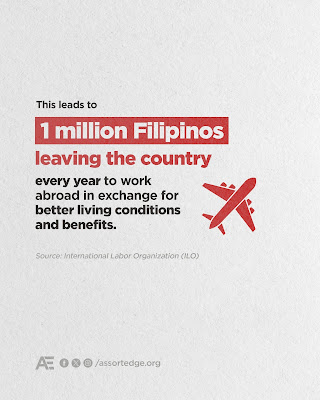
Thousands of graduates, but little to no workers left in the country. Regardless of the multiple doors of opportunities that the country has offered to the Filipinos, it still remains as one of the countries with a high worker migration rate due to the poor working conditions that many people still have to suffer in order to meet their basic needs.
This is no distant reality, but it is the future the country is currently heading, as the International Trade Union Confederation’s (ITUC) Global Rights Index 2025 reports how the Philippines joins the rank of the top 10 worst countries for workers for 9 consecutive years.
ITUC expounds in its report how workers in the country have effectively no access to rights for workers, which leads to autocratic regimes and unfair labor practices. It denotes how the country still lacks a concrete legal basis that protects and uplifts workers in the country for a better working environment.
From low salaries to being exposed to harassment, several factors contribute to why the Philippines retains its rank among the worst countries for workers.
In a 2022 report by the World Bank, the Philippines ranked 15th out of 63 countries when it comes to income inequality. It is cited in their report that causes such as unequal opportunities, “slow access” to tertiary education, inequality in college return, and social and gender norms (most notably in child care).
Philippine Statistics Authority in 2022 also detailed that roughly around 15.6 million workers work in the informal economy, without being covered by labor protection such as SSS and PhilHealth.
Additionally, the Center for Trade Union and Human Rights (CTUHR) reported that there have been more than 70 labor-related killings, and multiple harassments and illegal arrests in the labor field in the Philippines.
Through this, it has led
to a domino effect of results, which most often would lead to an
increase in the migration rates of workers in the country or brain
drain.
In a scale between nationalism and practicality, the sad reality is, many Filipinos would choose to be practical over their sense of pride in their own nation. High inflation rates, poor working conditions, and a lack of worker rights are a few of the problems that the Philippines continuously faces, which makes workers want to migrate, yet no action has been taken to sort out these problems.
The International Labour Organization (ILO) reported that 1 million Filipinos leave the country every year to work abroad in exchange for better living conditions and benefits. These reports do not reflect an astonishing rate, but the concerning situation that the Philippines is still stuck in.
With all constituents that add up to the working conditions that fail to boost the labor force in the country, there is no question as to why the Philippines still suffers from being one of the worst countries for workers for 9 consecutive years.
Although the Labor Code of the Philippines is the primary law that enforces labor and employment law in the country, it remains having its weaknesses and gaps that lead to the lack of an enforced framework to help ameliorate the workforce in the country.
With no enhanced policy and strengthened laws that help in aiding the labor aspect in the community, the Philippines still falls into a trajectory that places them still as a country with bad working conditions.
Thus, it is crucial that the Philippine Government must reflect upon this issue and invest in the labor and workforce of the country. Through initiatives such as amending the labor code in order to include legal actions such as improving the working conditions, increasing salary rates, protection against harassment and illegal arrests, and inclusion of employers under the informal employment sector are actions that wouldn’t just help ensure a better working environment but it would lead to a more progressive and decent workplace for all Filipinos.
Human only aspires to live in a place where they feel respected and treated fairly, especially after pouring their hard work, but only in exchange for the bare minimum of labor rights.
As the country reflects upon this ranking, may their eyes be open to the workers who work tirelessly but would only gain a low amount of salary. May their ears hear the noise that workers implore as they demand for rights.
And may their heart open for compassion to seek in their minds a way to uplift the country with a goal to be a nation that leads with a heart to protect its workers.
Source: The Philippines became a living hell for workers
Related post: The Philippines might be the new living hell for the working class.
Full credits to the sources.








Comments
Post a Comment